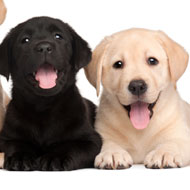New Welsh dog breeding regulations come into force

The requirements will include the introduction of a minimum staff ratio of one attendant for every 20 adult dogs.
Dog breeders in Wales are reminded that new breeding regulations come into force today.
The Animal Welfare (Breeding of Dogs) (Wales) regulations 2014 are part of a package of measures aimed at improving dog welfare in Wales. The requirements will include the introduction of a minimum staff ratio of one attendant for every 20 adult dogs.
Rebecca Evans, Welsh deputy minister for farming and food, said: "Last Summer I made a commitment to improve the standards of animal health and welfare in Wales for both farmed animals and pets when I launched the Animal Health and Welfare Framework. Since then we have been working on a number of measures with partners to raise the standards of dog welfare in Wales.
“Tomorrow [30 April] , new dog breeding regulations come into force aimed at stamping out any irresponsible breeding practices in Wales. Local Authorities and the WLGA will play a crucial role in ensuring that these regulations are implemented by breeders.
“I made a commitment that my officials would hold a training event for local authority enforcement officers and this was held last month. I am also aware that local authorities held a separate training/best practice event last week.”
The new law will apply to breeders who keep more than three breeding bitches. Among other requirements, breeders must create socialisation pals for puppies, as well as enhancement and enrichment programmes for all dogs under their care.
Councillor Neil Moore, WLGA spokesperson for regulatory services said: "Local Authorities across Wales have come together to discuss how to implement the new regulations fairly and consistently. We share the Ministers view that welfare standards for animals are extremely important, and Councils' roles are central to achieving this.
“The regulations will provide an opportunity for raising standards in the industry, where on occasion, improvement may be necessary. Licensing officers will be able to discuss the requirements of the regulations with any breeder who wants advice about the changes, and we would encourage them to do that."



 The Veterinary Medicines Directorate (VMD) is inviting applications from veterinary students to attend a one-week extramural studies (EMS) placement in July 2026.
The Veterinary Medicines Directorate (VMD) is inviting applications from veterinary students to attend a one-week extramural studies (EMS) placement in July 2026.